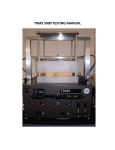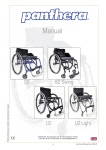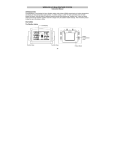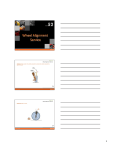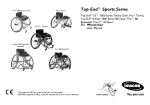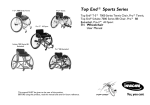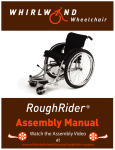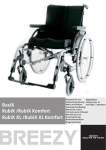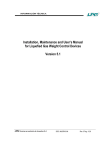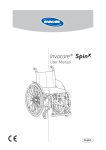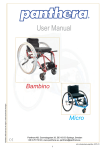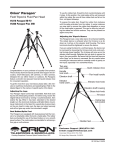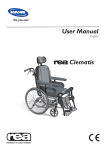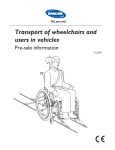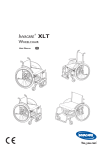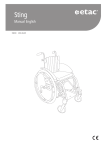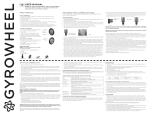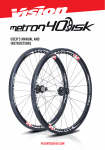Download USER MANUAL PANTHERA X
Transcript
USER MANUAL PA N T H E R A X C O N G R AT U L AT I O N S ! You are now the owner of a Panthera X – the world’s lightest wheelchair. Invented, designed and manufactured in Sweden, the Panthera X boasts an advanced composite carbon fiber structure, giving it the rigidity, strength and super-low weight normally associated with aerospace and Formula 1 equipment. And now, wheelchairs. Have fun! The Panthera team INTENDED USE To get the most out of your Panthera X, it needs Panthera X is a wheelchair made for very expe- to be adjusted and adapted to your requirements rienced and active users who are comfortable – by you or together with your prescriber. Please handling a ”tippy” wheelchair without tip protec- study the instructions carefully. tors. The design is optimized for easy handling in and out of cars and has extremely good riding characteristics. The very sleek and minimalistic design gives experienced and active users great opportunity to improve everyday life. Panthera X is not equipped with tip protectors, since it would impare the agility of the chair. It’s important that you feel comfortable handling the unique behaviour and characteristics of such a lightly balanced wheelchair before using it in a ”live” environment. As always, practice makes perfect. CONTENT 4 TECHNICAL INFORMATION – CARBON FIBRE 6 SAFETY 8 OVERVIEW 9 ADJUSTMENTS 12 TRANSPORT 13 TRANSFER 14 MAINTENANCE 15 TECHNICAL FACTS CE-MARKING GUARANTEE CARBON FIBRE The Panthera X is made from Advanced Carbon differently when damaged. Metal structures will Fibre Reinforced Plastics, CFRP, which can be bend and deform during failure. When a CFRP moulded into just about any shape. It may sound structure fails, it will lose most of its strength and simple, but is in fact a small technological wonder. rigidity, but without some of the telltale signs of Carbon fibre is a fantastic material. But it’s a material metal, such as bending and buckling. which works best with smooth, curved shapes that better distribute the force of high loads. Finding the CFRP structures are vulnerable to damage done perfect cross-section between smooth, strong shapes by sharp edges, sudden impacts and unusually, and ergonomic, practical design was an engineering local forces. If you suspect that your wheelchair challenge requiring years of development, experi- has been damaged, please inspect the entire mentation and practical testing. The result is the structure thoroughly or let a specialist inspect it. strongest and lightest wheelchair ever built. IMPORTANT FINALLY, A CAR FRIENDLY WHEELCHAIR Advanced Carbon Fibre Reinforced Plastics are Getting your wheelchair in and out of your car very strong and light materials, but also sensitive can be a real bother. But not anymore. Apart from to sudden impacts and sharp objects. Cracks and being the lightest wheelchair in the world, the other damages to the carbon fibre structure, for Panthera X is designed with space-saving dimensions example as a result of the wheelchair tipping over and ergonomic grips – making the chair easy to onto a hard surface, may lead to sudden breaks. load and stowe. Most people can actually lift the wheelchair with one hand. Avoid: • Dropping the chassis onto hard surfaces CARBON FIBRE CARE AND SERVICE Carbon Fibre Reinforced Plastics are stronger, lighter and more durable than metals, but behave 4 • Scratching and scraping the carbon ibre structure INSPECT YOUR WHEELCHAIR REGULARLY Press on areas you suspect have been damaged – watch for unusual flexing, bending or cracks. Run your hand over the chassis surface to check for cracks or loose fibres. Use slow, careful movements, to avoid getting any splinters in your hand. If you find anything that indicates damage, please contact Panthera AB. DO NOT try to repair the wheelchair by yourself. 5 SAFETY CONDUCT A TECHNICAL INSPECTION quickly to the actions you perform. If you perform OF THE CHAIR AND MAKE SURE THAT: the wrong actions the chair can tip backwards. The • The rear wheel axles should move smoothly chair can potentially tip up and it is not possible to in and out of the casing issue a warning regarding all the circumstances in The button at the hub should spring out which that might occur. The most important safety when the rear wheels have been inserted measures you can take include ensuring that you • All four wheels should touch the ground have tested the chair thoroughly and spend time • The caster fork can be easily rotated practicing your wheelchair technique. • The backrest folds down easily • If you have any questions about wheelchair techniBALANCE AND TIPPING CAPACITY que you should contact the person who prescribed The position of the backrest, the angle and the the chair / your therapist. If they are unable to adjustment of the backrest upholstery are the help you, please do not hesitate to contact us at most significant factors affecting the wheelchair’s Panthera AB. tendency to tip. After adapting your chair you 6 should check that you feel safe with the balance of BRAKES the chair. If you feel unsure, you should move the Remember that the brakes do not work as effectively backrest forward. The tipping capacity of the chair on tyres with poor air pressure or on worn tyres. is also affected by: hanging a bag on the backrest, If you change to a new brand of tyre you should leaning / stretching backwards, worn tyres, poorly always check the brakes since the dimensions may pumped tyres and unforeseen changes in the surface be different. The brakes are designed as parking you are driving on. brakes and not for braking when in motion. WARNING! NOTE! A Panthera wheelchair is designed to be as easy For the brakes to work properly make sure the tires to drive as possible and because of this it reacts have the right airpressure. See technical facts. SITTING POSTURE TRANSFERS / LIFTING CHAIR AND USER The wrong sitting posture can cause pressure sores. The chair is lightweight and for this reason it can If you are unsure you should contact your prescriber move sideways when the brakes are on and you straight away. Check that the side guards do not transfer from the side. If you are unsure you should exert too much pressure on your thighs since this practice this activity with your prescriber or thera- can cause pressure sores. If the side guards exert pist. If the wheelchair is lifted with you sitting in it, too much pressure, the chair is either too narrow the chair should always be lifted holding the frame or the side guards need to be adjusted. The seat is and not the backrest, the wheels or any other parts. designed to be used with a cushion. See fig.1 below. DRIVING If the distance between the lowest point of the footrest and the surface is small (less than 40 mm) the footrest can get caught on bumps in the surface and cause you to fall forwards. CARBON FIBRE Carbon fibre in free state is unhealthy but in bound form like in the Panthera X chassis, harmless. But if you make mechanical interventions on the chassis with a drill, saw or similar, carbon fibre particles can be exposed and harm your health if you don´t use professional safety equipment. Therefore all processing of the chassis on your own is not allowed. Partly because of health issues and partly because the strength of the chassis can be undermine strongly. FIG. 1 7 OVERVIEW UPHOLSTERY – BACKREST BACKREST FRAME BACKREST ATTACHMENT REARWHEEL – TIRE SEAT - CUSHION BRAKE LOCATION CHASSIS QUICKRELEASE HUB CALF BAND CASTOR FORK BRAKE LOCATION PUSH RIM FOOTREST 8 ADJUSTMENTS When ajusting the chair to suit your sitting position and provide the mobility you require, it is important that you make the following adjustments in the correct order. First, adjust the sitting position and after that, adjust the balance of the chair according to your mobility requirements. The sequence is important since when you change your sitting position you also change the balance of the chair. Consider that the effort you put into adapting your chair will provide long-term benefits later on. Try out different adaptations for a few days to make sure you really have found the best sitting posture and balance of the chair: 1. The tension of the seat upholstery 2. The height of the footrest 3. The tension of the calf band 4. The angle of the backrest 5. The tension of the backrest upholstery 6. The balance of the wheelchair 9 ADJUSTMENTS 1. TENSION OF THE SEAT UPHOLSTERY 3. TENSION OF THE CALF BAND (FIG. 5) (FIG. 3) The tension of the calf band, see fig.5, can be The rear section of the seat upholstery can be tight- adjusted and will affect how far forward you place ened or loosened by adjusting the Velcro strap under- your feet on the footrest. Loosen the velcro strap neath the seat as shown in fig. 3. This allows you and adjust to desired tension. to vary your seat height by about 2 cm up or down. 4. ANGLE OF THE BACKREST (FIG. 6) 2. HEIGHT OF THE FOOTREST (FIG. 4) The backrest has a stepless angle adjustment. The footrest can be adjusted up or down. Remove Adjust the angle of the backrest by first loosening the two screws supporting the footrest on the front the lock nuts (1), see fig.6, using cap key no. 17, of the frame as shown in fig. 4, unscrew using a and then screw the adjustment screws in or out (2) 3 mm allen key. You will then be able to move the using the 4 mm allen key. If you screw counterclock- footrest up or down to fit into one of the pre drilled wise the backrest will tilt forward and clockwise the height positions. You should adjust the footrest at backrest will tilt backwards. It is important to adjust a height where your thighs are supported by the both sides equally to avoid the backrest tubing becoming seat at the same time as your feet are supported crooked. Test this by putting the backrest in upright by the footrest. position and checking that both adjustment screws are touching the frame. Try out suitable backrest angles and tighten the lock nuts once you are satisfied. FIG. 3 FIG. 4 FIG. 5 5 5. TENSION OF THE BACKREST 6. BALANCING THE WHEELCHAIR (FIG. 8) UPHOLSTERY (FIG. 7) The Panthera X has a fixed rear axle so balancing The backrest upholstery can be tightened or is achieved by moving the body position in relation loosened by adjusting the Velcro straps at the to the rear axle. This can be done by moving the back (1). The backrest upholstery also has a flap backrest which can be fixed in 4 different positions. fastened with Velcro under the seatupholstery (2). The further back you mount the backrest, the more This can be moved back or forwards to obtain the likely your chair will tip over backward. This means required tension in the lower section of the back that the chair is light at the front and you have more upholstery (known as the seat bucket). By adjusting weight over the rear wheels. The chair is easier these things you can form the lower part of the to drive and it is also easier to tip up onto the rear back upholstery to suit the shape of your back and wheels to negotiate curbs and steps. The chair should obtain good support for your lower back. Start by not be balanced with the backrest too far back, loosening the band and sit as far back in the chair however, because of the danger of tipping over. as you can. Then tighten the band to give you good support. If it feels as though you are not sitting far back enough in the chair it may be because the back upholstery flap (2) is fastened too far forward under the seat. Relax this flap and move it back. 1 1 2 3 4 1 1 2 1 Fig. 7. FIG. 6 2 11 FIG. 7 FIG. 8 TRANSPORT We would like to make it quite clear that the best To insert the wheels, press in the button and push alternative for transportation in a vehicle is to the axle into the hole in the casing. Then push the transfer from the wheelchair into a regular passenger wheel all the way in, release the button and pull seat with a seatbelt. out to check that the wheel is securely in place and the button springs back out. When transporting the wheelchair in e.g. a car, you can remove the rearwheels and fold the backrest forward. See fig. 9. 1. Remove sideguards, if available. 2. Remove cushion, if available. 3. Fold the backrest forward. 4. Remove the rearwheels by pressing the center of the hubs and pull the wheels straight out. See fig. 10. 1 FIG. 9 FIG. 10 TRANSFER Techniques for transfer must be properly practiced by qualified personnel. The methods described below are only to be considered as important advice when transferring. SIDEWAYS • chair chassis and the other on the surface you Before transfer: • Back up the wheel chair 5-10 cm before stopping it to ensure the castor wheels are turned forward. The wheel chair should be positioned Place one hand on the far corner of the wheel are transfering from. • Carefully and with good balance heave yourself into till wheelchair. as close to the point of transfer as possible. • Lock the brakes, grab the support on the side IMPORTANT! Be very careful not to tip over back- you will be transferring from. wards with the wheelchair when transferring. 13 MAINTENANCE Your Panthera is designed to be virtually maintenance free. A few parts do require regular checking however. (Naturally you should clean and check the chair more often if you use it in more extreme environments such as in sand or salt water) ONCE A MONTH YOU SHOULD: 4. Fill up the tyres with air. The tyres can be pum- 1. Wipe the chair chassis over with washing-up ped by screwing the top off the valve and filling liquid and a damp cloth. If very dirty you can use with air using an appropriate valve adapter. The a degreasing agent. tyre can take 8 bar / kg of pressure. 2. Lubricate all moveable parts with a universal 5. Check that all the screws and nuts are securely lubricant (5-56, WD-40) after cleaning. Clean the fastened. caster fork casing (between the wheel and the fork). Hair and dust collect here which can damage the Check that the chair has not been damaged. bearing. Remove the wheel by loosen the screws If damage has occurred, immediately contact using allen key 4 mm. Clean the washers between Panthera AB. the wheel and the fork and wipe the outside of the wheel bearing with a cloth. Drop some oil into each bearing. Reassemble the parts. TWICE A YEAR YOU SHOULD: 1. Lubricate the joints of the brake with some drops 3. Lubricate the rear wheel axles. Remove the of oil. wheel and distribute some drops of oil over the 14 axle. You should do this more often if you drive in 2. Wash the seat upholstery, the back upholstery rain, sand, salt and slush or if you rarely remove and the cushion cover in 40°C machine wash when the wheels. necessary. T E C H N I C A L FA C T S GUARANTEE AND LIFETIME The service life of the Panthera X depends on how much External accessories such as hand bikes and fixed back- wear it is subjected to and how careful you are with main- rests with installation performed with clamping hardware tenance. around the chassis tube or modifications to the chassis are not permitted. Important! Avoid: Carbon fibre is a very strong material but sensitive to impact • Dropping/putting down the chassis on a hard surface and hard shocks. As an example, a fall backwards in the • Knocking the chair over backwards wheelchair against a hard surface can cause damage to • Scratching or eroding the carbon ibre construction the back frame. Damages caused by external forces are not covered by the warranty. Guarantee: We offer a five year factory guarantee on the chassis. For other parts there is a guarantee of 12 months. Maximum userweight: 100 kg. 15 MARKING The CE marking and serial number are located on the The manufacturer’s contact information is located on the under side of the wheel chair, to the left on the chassi under side of the wheel chair, to the left on the chassi joining tubes. See picture below. joining tubes. See picture below. EAN CODE CE MARK MANUFACTURING DATE SERIAL NO. MODEL MAXIMUM USER'S WEIGHT ARTICLE NUMBER SEAT WIDTH


















